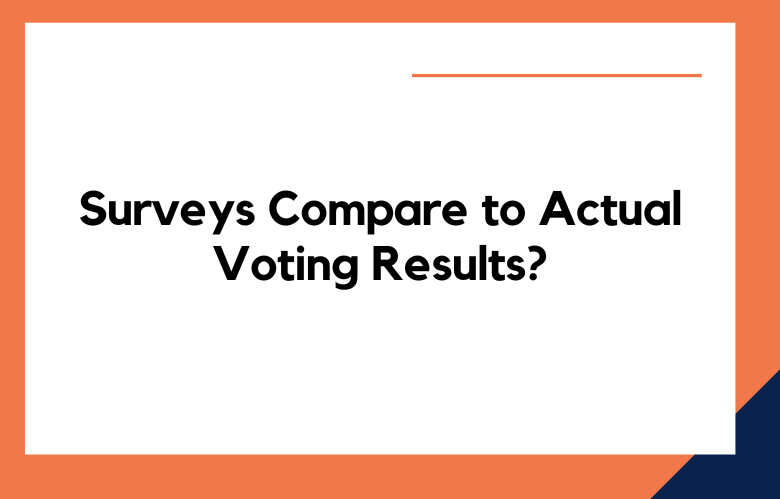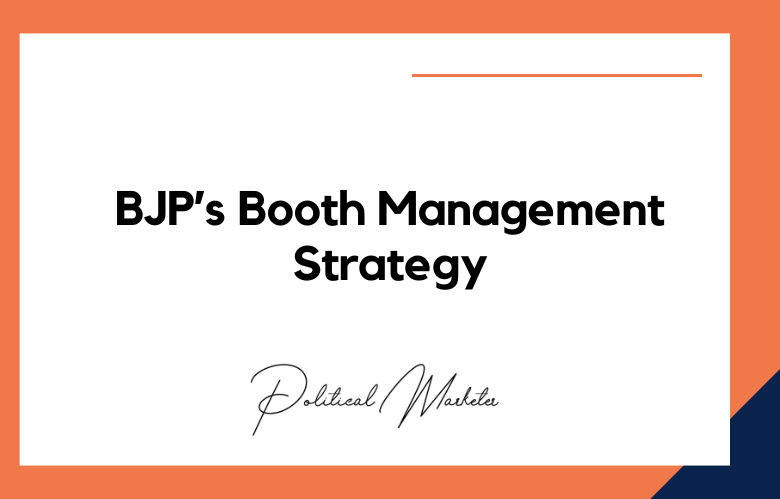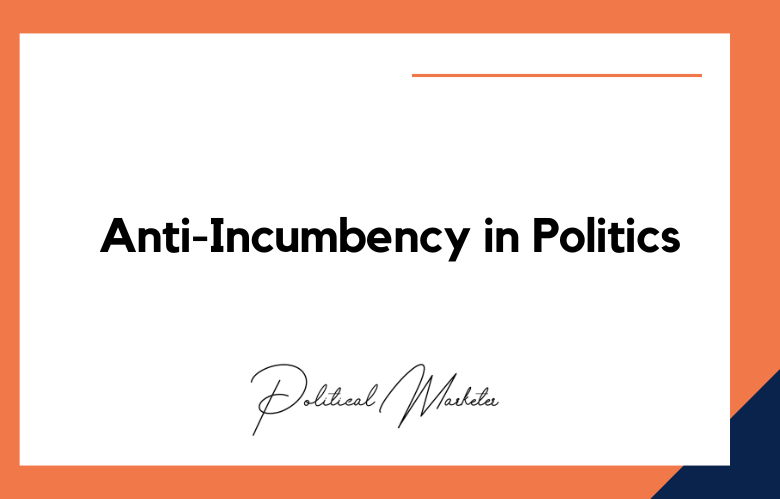Surveys have become an essential tool in predicting outcomes in politics and elections. Election surveys are widely used by politicians, political parties, and the media to gauge the public’s opinion about an upcoming election.
However, the question remains – do these surveys accurately reflect actual voting results? We will examine how election surveys work, their reliability, and how they compare to voting results.
How Do Election Surveys Compare to Actual Voting Results?
How Election Surveys Work
Election surveys work by sampling a representative group of individuals who are eligible to vote in a particular election. The surveys ask questions about the candidates, issues, and other relevant topics to gauge voter’s opinions. The answers are then analyzed to predict the outcome of the election. Surveyors use various methods to collect data, including phone calls, online surveys, and door-to-door interviews.
The Reliability of Election Surveys
The reliability of election surveys can be affected by various factors, such as the sample size, the sampling method, and the timing of the study. The most reliable surveys are based on a large enough sample size to accurately capture the voting population’s diversity.
The sampling method should also be random to avoid any bias, and the timing of the survey should be close enough to the election date to reflect any last-minute changes in voter’s opinions.
Comparing Election Surveys to Actual Voting Results
While election surveys are designed to predict the outcome of an election, they are not always accurate. Many factors can change from the time of the study to the actual election date, such as a last-minute scandal, unexpected events, or changes in voter’s opinions.
Election surveys can also not account for voter turnout, as some surveys may not accurately reflect how many registered voters will cast their ballots on election day.
Other Factors Affecting Election Results
Election results are also affected by other factors, such as the type of election, the candidates, and the issues at stake. In some cases, factors such as local interests, campaign strategies, and outside influences can also affect the outcome of an election. In such cases, election surveys may not be able to account for these factors.
Making Sense of Election Surveys
While election surveys may not accurately represent an election outcome, they still serve a valuable purpose in politics. Surveys help candidates and political parties gain insight into the public’s opinions and concerns.
They can also help the media and other organizations accurately report on the state of an election. When interpreted correctly, election surveys can provide a valuable tool for understanding the public’s opinion and making sense of the political landscape.
The Pollsters vs. the People: Examining the Gap Between Election Surveys and Voting Results
In recent years, election surveys have been scrutinized due to a growing gap between polling numbers and voting results. This gap has been observed in numerous elections across different countries, leading some to question the accuracy and reliability of pollsters.
For instance, in the 2016 US presidential election, most major polling organizations predicted a comfortable victory for Hillary Clinton. However, on election day, Donald Trump won the Electoral College and the election. This was not an isolated incident, as similar discrepancies were observed in the Brexit referendum and the 2019 Canadian federal election.
A Balancing Act: Understanding the Differences Between Election Polls and Actual Voting Outcomes
Election polls are an integral part of the democratic process, allowing us to understand the potential outcomes of an election before the actual voting takes place.
However, such polls have been criticized for misleading expectations and generating incorrect predictions. In many cases, election polls can miss underlying currents of public opinion, leading to disparities between the projected outcomes and the actual voting results.
While election polls mainly consider the opinions of a sample of voters, actual voting outcomes are determined by the collective actions of millions. Voting outcomes reflect various factors, including individual beliefs, emotions, priorities, and social preferences, which a poll may not accurately capture. Moreover, developments like late-breaking news, changes in campaign strategies, or unexpected political events can dramatically alter election outcomes in ways that polls cannot predict.
From Statistics to Reality: Analyzing the Discrepancies between Election Surveys and Voting Results
Importance of Accurate Election Surveys
Election surveys play a crucial role in predicting the outcome of an election and shaping public opinion. They are used by political parties, media outlets, and voters to make informed decisions. However, when these surveys do not align with the actual voting results, it can lead to confusion and mistrust in the accuracy of polling data.
Factors That Contribute to Discrepancies
Several factors can contribute to discrepancies between election surveys and voting results. These include sampling errors, non-response bias, social desirability bias, and changes in voter behavior. Pollsters need to consider these factors when conducting surveys to improve their accuracy.
Impact on Political Campaigns
Discrepancies between election surveys and voting results can significantly impact political campaigns. When survey results show one candidate as the clear frontrunner, it can influence voters’ perceptions and potentially discourage them from supporting other candidates. This can ultimately affect the outcome of an election.
Media Influence on Public Opinion
Media outlets often use election surveys to gauge public opinion and shape their coverage of political campaigns. When survey results differ from voting results, it can lead to biased reporting and misrepresenting public sentiment. This highlights the importance of accurate polling data in shaping public discourse.
Trust in Polling Data
The discrepancies between election surveys and voting results can also erode trust in polling data among the general public. This can lead to skepticism toward future survey results and potentially undermine pollsters’ credibility and methodologies.
Importance of Transparency
To build trust in polling data, pollsters must be transparent about their methods and share their findings openly with the public. This includes disclosing sample size, demographics, and potential biases that may have influenced survey results.
Role of Technology
Advancements in technology have made it easier for pollsters to collect and analyze data, but they also present new challenges. For example, the rise of cell phones and caller IDs has made reaching a representative sample of voters more complex, leading to potential inaccuracies in survey results.
The Human Element
Despite technological advancements, a human element is still involved in election surveys. Factors like interviewer bias and human error can also contribute to discrepancies between survey results and voting outcomes.
Improving Survey Methodologies
To improve the accuracy of election surveys, pollsters must continually evaluate and update their methodologies. This may include adjusting sampling techniques, using multiple modes of data collection, and considering alternative methods such as online surveys.
The Need for Continuous Analysis
The discrepancies between election surveys and voting results highlight the need for continuous analysis of polling data. By examining past discrepancies and identifying potential sources of error, pollsters can work towards improving the accuracy of future surveys and ultimately provide more reliable information for decision-making.
Conclusion:
Election surveys are a valuable tool used to predict the outcome of an election. However, they are not always accurate, and many factors can affect their reliability and election results. Nonetheless, they provide valuable insight and analysis of the public’s opinion and political landscape. It’s essential to interpret election surveys carefully and consider all other factors affecting the outcome.
Call: +91 9848321284
Email: [email protected]
Frequently Asked Questions (FAQs)
What are election surveys and how are they conducted?
Election surveys, or opinion polls, are conducted to gauge public sentiment and voting intention by sampling a representative subset of the population using methods like phone interviews, online questionnaires, or face-to-face interviews.
How accurate are election surveys in predicting actual results?
Accuracy depends on methodology, sample quality, timing, and external factors. While some polls closely predict outcomes, others deviate significantly due to sampling errors, voter turnout miscalculations, or late shifts in public opinion.
What causes the gap between surveys and election results?
Key factors include shy voters, social desirability bias, late decision-making, poor sampling techniques, inaccurate turnout models, and underrepresentation of specific voter groups.
What is the margin of error in election surveys?
The margin of error indicates the range within which the true value likely falls. A ±3% margin of error means results could vary by 3 percentage points above or below the reported figure.
Do undecided voters impact the accuracy of polls?
Yes. A significant percentage of undecided voters can swing the final result, especially in close races, making predictions less reliable as surveys often allocate them based on assumptions.
How does voter turnout affect poll accuracy?
Polls estimate likely voters, but actual turnout may differ due to motivation, barriers, or last-minute changes, causing discrepancies between predicted and actual outcomes.
What are likely voter models in polling?
These models predict which respondents are likely to vote based on past behavior, enthusiasm, demographics, and expressed intent, but they’re not always accurate.
Can polling data be manipulated or biased?
Yes. Biased question framing, non-random samples, or deliberate weighting choices can skew results, whether intentionally or due to methodological flaws.
Why were many 2016 and 2020 polls criticized?
They underestimated support for certain candidates, often due to under-sampling specific demographics (e.g., non-college-educated voters) and misjudging turnout.
What is the difference between national polls and state-level polls?
National polls reflect overall sentiment, while state polls are more relevant in systems like the U.S. Electoral College, where state outcomes determine final results.
How important is the timing of a poll?
Polls conducted closer to election day are generally more accurate. Early polls may not account for campaign developments or voter sentiment shifts.
What is a polling aggregator and how does it work?
Polling aggregators compile multiple polls and apply statistical methods (like weighting or smoothing) to produce more reliable trendlines and averages.
How do pollsters ensure their samples are representative?
They use random sampling, demographic quotas, and statistical weighting to match population characteristics like age, gender, location, and education level.
Are online polls as reliable as traditional methods?
Online polls are growing in use but vary in quality. Their reliability depends on recruitment method, platform biases, and whether respondents self-select.
What role does confirmation bias play in poll interpretation?
People tend to trust polls that confirm their beliefs and dismiss opposing ones, which can distort public perception and lead to overconfidence or disillusionment.
How do exit polls differ from pre-election surveys?
Exit polls are conducted on election day as voters leave polling stations and provide real-time data on voter behavior, though they too can be affected by bias.
Can polls influence voter behavior?
Yes. Polls can create bandwagon effects (supporting the leader), underdog sympathy, or voter apathy if one side appears to be winning decisively.
What safeguards ensure polling transparency and credibility?
Reputable pollsters disclose methodology, sample size, margin of error, funding sources, and question wording to allow scrutiny and comparison.
How should political campaigns interpret poll data?
Campaigns should use polling trends, not isolated data points, to adjust messaging, allocate resources, and identify voter segments needing engagement.
What is the future of election polling?
Expect more use of AI and machine learning for modeling, increased focus on qualitative insights, hybrid data sources, and better voter turnout prediction algorithms.











